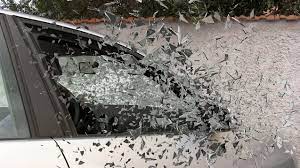Khawaja Wajihuddin
On a visit to China I saw two new cars colliding with each other. I expected that the road would be blocked and both the car drivers would start fighting. But to my astonishment road was cleared immediately by the drivers. In a few minutes the authorities came, took some photographs, noted down the necessary details and in a few minutes the matter was over. On inquiry I was told that with due use of technology they have determined the actual matter and financial aspect will be resolved through insurance.
According to the latest WHO data published in the year 2020 road traffic accidents deaths in Pakistan reached 28,170 or 1.93% of total deaths. Some reports on line say that they are much more. Anyhow WHO estimated Fatalities per 100,000 population was 14.3. Estimated Serious Injuries, for the year 2016: were 413,730. Most of the road accidents in Pakistan, the main cause is negligence of drivers who indulge in rash driving listening to songs.
Over speeding, overloading, wrong overtaking and breaking traffic rules is a normal routine. The mechanical faults of the vehicles and deficiencies in road environments also contribute massively towards the accidents. Casual attitude of the masses is one of another reason of these tragedies. It can be stated without any fear of contradiction, that frequency of road accidents has assumed gigantic proportions. The statistics mentioned above are alarming.
It seems that no serious effort is being made to address the real causes. The fact of the matter is that in our society, which is now a hollow and decadent society by any stretch of imagination. Our values have crumbled like a house of cards. Respect for the law and order has vanished altogether. People have resorted to street justice. Some of us have amassed enormous wealth in utter disregard of ethics and morality. Nobody cares except for himself. In case of accidents people who are culprits go scot-free, for many reasons including many chinks in the law.
It’s very rare that an accused guilty of an accident is convicted and sentenced under the law. Percentage of such convictions may not be more than.1%. In my career as judicial officer I have seen a number of serious accident cases. None of the cases resulted in conviction of the accused, except one.
I remember one of the newly appointed judicial officers travelling in a public transport was killed in an accident. The young boy with a few days of judicial service met his tragic end because of the fault of the driver of the vehicle. It was very unfortunate. The matter ended on compromise.
I remember at one of the stations a Hiace collided with another vehicle and one of the children died on the spot. In fact he was cut to pieces and his brain was lying on the road.The helpless father could not do anything except to collect the remaining parts of the brain from the road and went away. Though the law came into motion but the matter was ultimately compromised. At another station a bus full of passengers met an accident killing majority of them. No one could depose against of the accused, the injured and the legal heirs compromised hence the accused was acquitted.
At yet another station chair lift (still used in Pakistan as a means for crossing the river) had an accident drowning more than 30 people in the river underneath. No one deposed against the accused and the matter was compromised. I vividly remember one of the witnesses in that case saying that he does not trust the system and he cannot afford to annoy the elders of the locality. Yet again the accused was acquitted.
In the last winters, I had a chance, because of the fog, to use link roads leading to the main GT Road. The roads were pathetic to say the least. With the introduction of the motorways some roads have become much improved but the precious loss of human life continues unabated. There may be many reasons for that. We will examine legal loopholes only.
Section 279 PPC deals with Rash and negligent driving on a public way. It says that, Whoever drives any vehicle, or rides, on any public way in a manner so rash or negligent as to endanger human life, or to be likely to cause hurt or injury to any other person, shall be punished with imprisonment of either description for a term which may extend to 2[two years] or with fine which may extend to 1[three] thousand rupees, or with both”. The offence under this Section is a cognizable offence, which means that the police authorities have the power to arrest the accused without a warrant. The offence is bailable, and non-compoundable.
According to section 318 Of the Pakistan Penal Code “Whoever, without any intention to cause the death of, or cause harm to, a person causes death of such person, either by mistake of act or by mistake of fact, is said to commit “QatliKhata” 320 of the Pakistan penal code deals with Punishment for QatliKhata by rash or negligent driving.
It says that “Whoever commits “QatliKhata “by rash and negligent driving shall, having regard to the facts and circumstances of the case, in addition to “Diyat”, be punished with imprisonment of either description for a term which may extend to ten years. It’s is bailable and compoundable. For ordinary people these mean accident cases. Both These sections of law are bailable. That means a person arrested in the cases is granted bail as a matter of right. The law is like that.
There is no way to keep the accused behind the bars except by not accepting his bail bonds for a few days.
Even at the stages of trial what is seen is that unfortunately the matter is considered compromised in the non-compoundable offence of section 279 PPC and the offense is considered as compounded with the main offense of Section 320 PPC and hence many accused go Scott free. Sometimes it is lack of evidence or insufficiency of evidence produced by the prosecution or collected and preserved by the local police.
I recollect that at the time of enactment of the quoted sections of law the original proposal was to make them not bailable. However, due to public reaction the government scumbled to the pressure. The result of the same is for everybody to see. It’s a known fact that accused by use of money, threat or coercion, end up settling with the other party during the trial and compromise the matter.
As a student I remember one of the honourable judges at that time having said that after this enactment the powerful would kill the Underprivileged and the helpless segment of society and then would force them to compromise. This is what is exactly happening in Pakistan. It’s a known secret that majority of the public transport is controlled by some very powerful people.
As a student of law would like to propose following suggestions to improve the situation:
Sections 279 and 320 of the Pakistan Penal Code be made non-bailable and non-compoundable. In addition to 279 and 320 PPC, section 322 PPC should be added in the FIR against the accused. As the issuing of licenses have been computerized, it would be proper to make an entry on the record of the accused (Driver of a public transport), which should be reflected on the license, through a red stripe, so that he should feel the pinch while applying for a job in future.
In case the accident involves a public transport like bus, truck, mini bus, Hiace, taxi, Suzuki or a wagon, it should be impounded immediately and only released when compensation is paid to the bereaved family by the driver or its owner. The rate of compensation should be fixed at least 5 million, and should be recovered as arrears of land revenue. The punishment under section 279 PPC should be enhanced to 10 years along with a fine off Rs.5 million which should be paid as compensation to the legal heirs of the deceased.
More use of scientific technology be used to check the over speeding of the vehicles plying on the road. The example of Motorway police should be followed by;
Crime scene preservation be improved through geo-fencing and videotaping instead of conventional site plans so as to reduce dependence on ocular evidence. Motor vehicle ordinance be strictly implemented by impounding all vehicles not registered in the name of the drivers.
Challans must include assessment of cost of injuries and compensation/”Takhmeena-e-Zarar”. CCTV installation must be ensured on all roads at multiple points. Orientation of traffic laws must be part of curriculum. Vehicles and drivers involved in accident cases must not be allowed to come on roads and drive unless the case is decided.
I would conclude by saying that this being a human problem, entails misery for the unfortunate victims including their Kith and Kin and Merits spontaneous reaction by the concerned authorities.
(The writer is a former Registrar Peshawar High Court)







